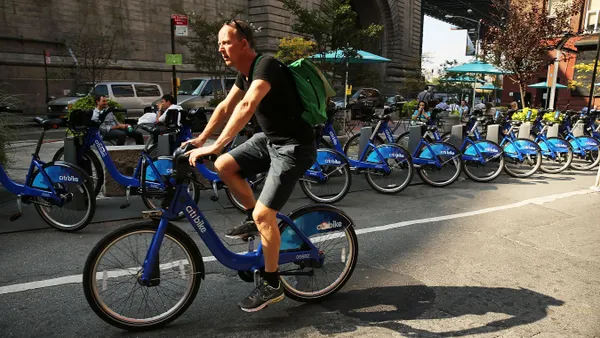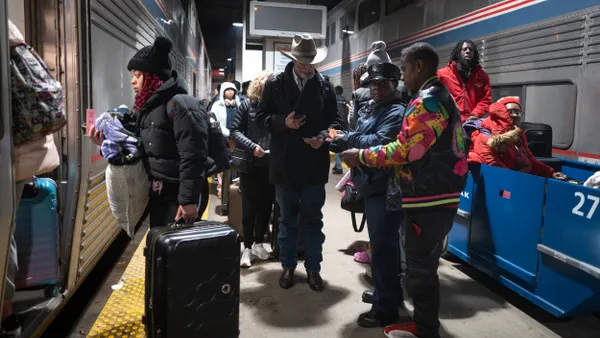UPDATED, Oct. 1, 2019: Shelby County, TN Mayor Lee Harris has modified his proposed "sustainability fee" on households with three or more cars following a period of public feedback. A household with three or more cars will now only be charged a total annual fee of $145 under the proposal; the household will not receive a fee per vehicle beyond three cars, according to WKNO.
Motorcycles and trailers are also no longer included as additional vehicles under the proposal.
While the mayor has received support for this proposal — which is intended to raise millions for the Memphis Area Transit Authority — it still faces some opposition from homeowners and business owners. Shelby County will hold another public meeting on the proposal on Friday.
Dive Brief:
- The mayor of Shelby County, TN proposed an annual "sustainability fee" on households with three or more vehicles that will go toward transit projects. The $145 fee would apply to each car (beyond the first and second cars) a household owns.
- The county estimates the fee — which will affect 17% of households — would raise $9 million each year in addition to a $1 million contribution from the city's Capital Improvement Fund (CIP) fund. Each contribution would go toward expanding and improving the Memphis Area Transit Authority's (MATA) service. The Shelby County Commission is expected to vote on the measure by late February, following a public hearing and comment period.
- The plan is designed to address a number of problems including a lack of access to transit, a lack of access to jobs via transit, traffic congestion and vehicle emissions. "You want to have your problem and solution match," Mayor Lee Harris told Smart Cities Dive. "The solution here is to get those who probably contribute to traffic congestion to contribute to the solution... The folks who are probably doing their fair share of getting around and creating emissions and traffic congestion, let's try to get them to help the folks who can't get around at all right now."
Dive Insight:
Many U.S. cities are trying to come up with creative ways to tackle congestion and vehicle emissions while also funding their transit systems. Chicago is among the cities that added an extra ride-hailing tax that funds transit. Others are following New York's lead and pursuing congestion pricing.
The proposal in Shelby County — which has Memphis as its county seat — is rather unique in targeting people with three or more vehicles to fund transit. The period between the initial proposal and the county commission's expected February vote timeframe will allow ample time for the public to understand the measure and for leaders to make any necessary changes to the plan, according to Harris. He anticipates that the exact cost of the fee per vehicle might be one of the topics up for further discussion.
The proposal is in line with the ideas laid out in the region's transit vision. The main goal is to add transit routes to MATA's existing network of 44 and increase the frequency of buses. Some of those bus routes only come once an hour, Harris said. He'd like to get that down to once every half hour, and in some cases, once every 15 or 20 minutes.
"[The proposal] will start to solve a problem that has been festering for more than a decade. Transit has seen its funding go down," Harris said. "We're sitting in 2019 at a ridership level of 7 million riders a year, which seems like a lot, but 7 million is probably half of the number of riders we had 10 years ago before the cuts to transit started to take hold."
There has been some public pushback in the short time since the measure was introduced this week, as well as questions raised by city workers including the county clerk. But Harris hopes people will get on board once they learn all the aspects of the plan and the widespread community benefits.
"It's a pretty innovative approach... Obviously, there's going to be some negative reaction to an additional fee," he said. But he said the public likely will come around if they "hear more of the story, that it doesn't really apply to most people and it's a way to generate resources for something that can benefit the public at large without a general tax increase."










